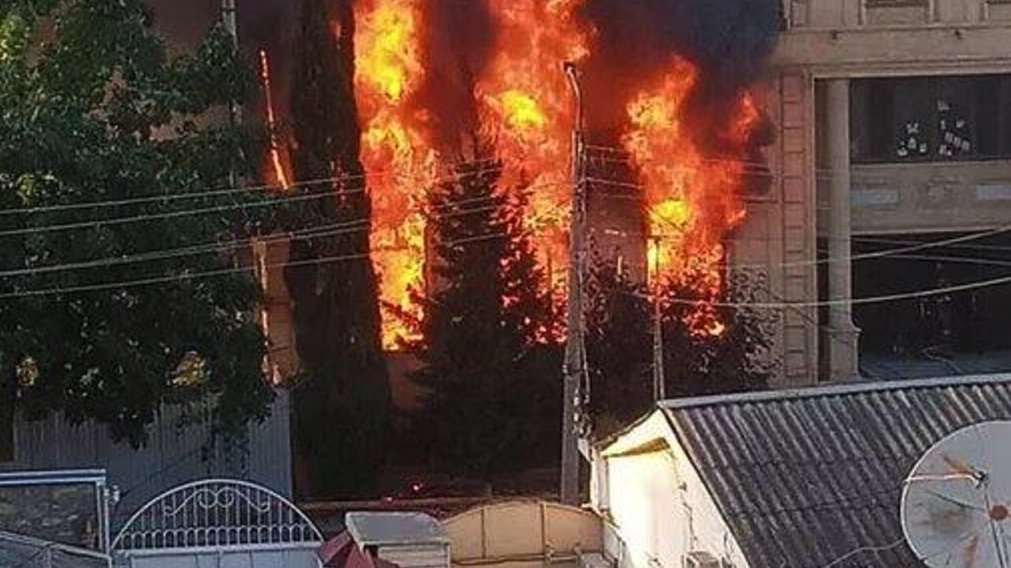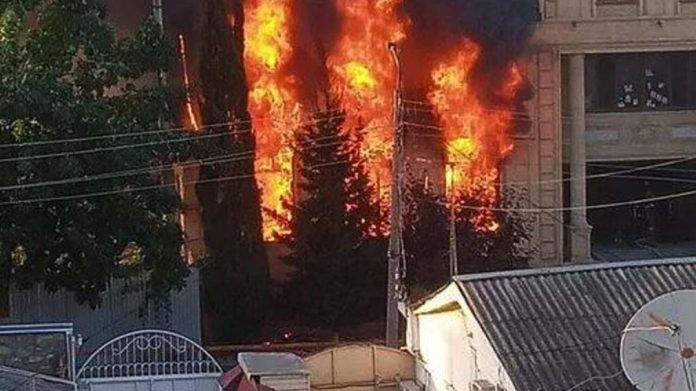การโจมตีเจ้าหน้าที่ตำรวจ โบสถ์ และธรรมศาลาในสาธารณรัฐดาเกสถานทางตอนเหนือของคอเคซัสของรัสเซีย ส่งผลให้มีผู้เสียชีวิตจำนวนมาก มือปืนมุ่งเป้าไปที่เมือง Derbent และ Makhachkala ในช่วงเทศกาลเพนเทคอสต์ออร์โธดอกซ์ (Orthodox festival of Pentecost) เหยื่อประกอบด้วยเจ้าหน้าที่ตำรวจ นักบวช และเจ้าหน้าที่รักษาความปลอดภัยอย่างน้อย 15 คน ผู้โจมตีหกคนถูกสังหาร และตำรวจกำลังค้นหาผู้ต้องสงสัยเพิ่มเติม แม้ว่าจะไม่ระบุตัวผู้ก่อเหตุได้ แต่ดาเกสถานก็เคยประสบกับการโจมตีของกลุ่มอิสลามมาก่อน
การโจมตีเมื่อวันอาทิตย์มุ่งเป้าไปที่โบสถ์สองแห่งและธรรมศาลาสองแห่ง นักบวชในโบสถ์ออร์โธดอกซ์ถูกสังหารในเมือง Makhachkala เมืองที่ใหญ่ที่สุดของดาเกสถาน เซอร์เกย์ เมลิคอฟ ผู้นำพรรครีพับลิกันของดาเกสถาน ยืนยันว่ามีเจ้าหน้าที่ตำรวจ 15 นายถูกสังหาร คลิปวิดีโอบนโซเชียลมีเดียแสดงให้เห็นผู้คนในชุดสีเข้มยิงใส่รถตำรวจก่อนที่รถบริการฉุกเฉินจะมาถึง ในเมือง Derbent ซึ่งเป็นที่ตั้งของชุมชนชาวยิวโบราณ กลุ่มมือปืนได้โจมตีและจุดไฟเผาโบสถ์ยิวและโบสถ์แห่งหนึ่ง Mash ช่องทางโทรเลขอย่างไม่เป็นทางการรายงานว่ากลุ่มมือปืนปิดล้อมตัวเองอยู่ในอาคารแห่งหนึ่งในเมือง Derbent นอกจากนี้ รถตำรวจยังถูกโจมตีในหมู่บ้าน Sergokal ตำรวจได้จับกุม มาโกเมด โอมารอฟ หัวหน้าเขต Sergokalinsky ใกล้ Makhachkala หลังจากมีรายงานออกมาว่า ลูกชาย 2 คนของเขามีส่วนเกี่ยวข้องในการโจมตีเมื่อวันอาทิตย์
ดาเกสถาน ภูมิภาคที่ประชากรส่วนใหญ่เป็นมุสลิมและยากจนของรัสเซีย มีประวัติการโจมตีของกลุ่มญิฮาดจากกลุ่มต่างๆ เช่น แคว้นคอเคซัสและเอมิเรตอิสลามแห่งคอเคซัสระหว่างปี 2550 ถึง 2560 ในเดือนมีนาคม หลังการโจมตีใกล้มอสโก ทางการกล่าวโทษยูเครนและชาติตะวันตก แม้ว่ากลุ่มรัฐอิสลามจะออกมาอ้างความรับผิดชอบก็ตาม ประธานาธิบดีปูตินยืนยันว่ารัสเซียรอดพ้นจากการก่อการร้ายแบบนิกายฟันดาเมนทัลลิสท์ (Islamic fundamentalist terrorism) เนื่องจากความสามัคคีระหว่างศาสนา อย่างไรก็ตาม เมื่อสามเดือนที่แล้ว หน่วยงานรักษาความปลอดภัยภายในประเทศของรัสเซีย Federal Security Service (FSB) ได้ขัดขวางแผนการของ IS ที่จะโจมตีธรรมศาลาในมอสโก นับตั้งแต่การรุกรานยูเครน ทางการรัสเซียยังคงรักษาเรื่องเล่าที่ว่ายูเครนและ “กลุ่มตะวันตก” เป็นศัตรูหลัก โดยหลีกเลี่ยงการเปลี่ยนแปลงเพื่อป้องกันข้อสงสัยของสาธารณชน
Deadly attacks on synagogues and churches in Dagestan as Gunmen open fire on cars and set buildings ablaze.

Attacks on police officers, churches, and synagogues in Russia’s North Caucasus republic of Dagestan have resulted in numerous fatalities. Gunmen targeted the cities of Derbent and Makhachkala during the Orthodox festival of Pentecost. The victims include at least 15 police officers, a priest, and a security guard. Six attackers were killed, and police are searching for additional suspects. While the assailants have not been identified, Dagestan has previously experienced Islamist attacks.
Sunday’s attacks targeted two churches and two synagogues. An Orthodox Church priest was killed in Makhachkala, Dagestan’s largest city. Dagestan’s republican leader, Sergei Melikov, confirmed that 15 police officers were killed. Footage on social media shows people in dark clothing shooting at police cars before emergency service vehicles arrive. In Derbent, home to an ancient Jewish community, gunmen attacked and set fire to a synagogue and a church. An unofficial Telegram channel, Mash, reported that gunmen had barricaded themselves in a building in Derbent. Additionally, a police vehicle was attacked in the village of Sergokal. Police detained Magomed Omarov, head of the Sergokalinsky district near Makhachkala, after reports emerged that two of his sons were involved in Sunday’s attacks.
Dagestan, a predominantly Muslim and impoverished region of Russia, has a history of jihadist attacks from groups like the Caucasus Emirate and the Islamic Emirate of the Caucasus between 2007 and 2017. In March, after an attack near Moscow, authorities blamed Ukraine and the West, despite the Islamic State claiming responsibility. President Putin had asserted that Russia was immune to Islamic fundamentalist terrorism due to its interfaith harmony. However, three months ago, the FSB thwarted an IS plot to attack a Moscow synagogue. Since the invasion of Ukraine, Russian authorities have maintained a narrative that Ukraine and the “collective West” are the main adversaries, avoiding changes to prevent public doubt.
By BBC NEWS

















